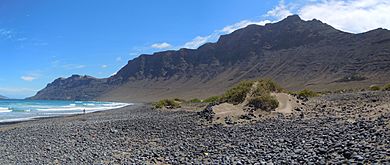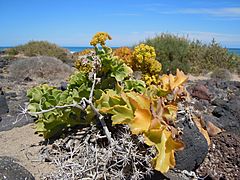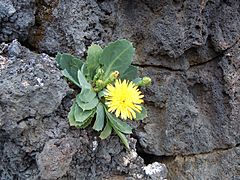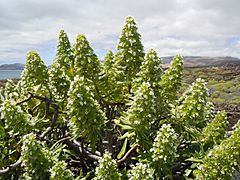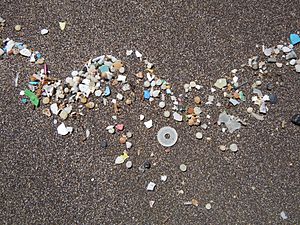Famara facts for kids
Famara is a big mountain range in the north of Lanzarote, one of the Canary Islands. It's actually the side of an ancient volcano that erupted millions of years ago. The tall cliffs of Famara (called Risco de Famara) are what's left of a huge volcano crater. This crater was about ten kilometers wide and centered near the island of La Graciosa.
The highest point of these cliffs is called the Peñas del Chache, reaching 671 meters high. There's also a village by the sea called Caleta de Famara, which is part of the Teguise area.
Contents
Famara Beach: A Surfer's Paradise
South of the Famara cliffs, you'll find Playa de Famara, a beautiful beach made of sand and small volcanic rocks. It stretches for two kilometers. Because it faces the Atlantic Ocean, it's a perfect spot for surfing!
A popular seaside village, Caleta de Famara, has grown up here. It is part of the Teguise municipality.
Nature and Wildlife at Famara
The coast north of Famara beach is closed off by cliffs. You can't reach it by car. This area is very special because it has lots of different plants and animals. About ten types of plants found here grow nowhere else in the world!
All the Famara cliffs and the coastline are part of the Chinijo Archipelago natural park.
Unique Plants of Famara
There are about ten types of plants that only grow on the coastal plain at the bottom of the Famara cliffs. These plants became unique because they have been isolated for over a million years.
Plastic Pollution on the Beach
Because Famara Beach faces currents from the west, it often collects trash from the North Atlantic garbage patch. This means plastic waste from the ocean can wash up on its shores.
See also
 In Spanish: Famara para niños
In Spanish: Famara para niños
 | James Van Der Zee |
 | Alma Thomas |
 | Ellis Wilson |
 | Margaret Taylor-Burroughs |


